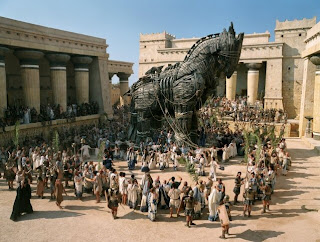 Hamlet
HamletAs it is perhaps the most acclaimed Shakespeare adaptation of all time, starring the greatest Shakespearean actor of all time in what some would argue is the best play of all time, you would think that Laurence Olivier's Hamlet would be higher on my list of awesome movies. Unfortunately, I found it to be a rather mixed bag.
The main problem is that I just don't like the old style of Shakespeare acting. I find it to be stagy and showy and fake. I just can't believe in the characters because they are too busy prancing across the stage saying, "Look at ME, I am doing SHAKESpeare." I prefer the approach where the language is spoken as if people are actually saying it. So maybe I am not a fair judge for this movie, because I am biased from the start.
I have to give Olivier props, though. He tries to update the play and make it more cinematic and palatable for those who don't understand the poetry. He experiments with extreme camera angles, chiarrascoro lighting, and some genuinely spooky use of fog machines for the Ghost scene. Olivier the director is far more interesting than Olivier the actor. A good example of this can be seen in another Olivier directorial innovation. Instead of having the actors speak their monologues out loud, he has them 'think' the monologues...almost like narration. Unfortunately, it is a good idea gone bad and allows for some spectacular overacting as Oliver's face contorts in exaggerated expressions to match the emotion of his monologue. Sooo cheeeeesssyyyy....
On the other hand, I can objectively see why this won Best Picture in 1948. It may be dated now, but the movie must have seemed innovative at the time - a valiant and successful attempt to make Shakespeare more accessible. This blew the socks off the audiences half a century ago. But it doesn't age well. And it is far from the definitive Shakespearean adaptation that it is made out to be. And I prefer Olivier's non-Shakespearean work. And while I'm at it, I prefer the play Julius Caesar to Hamlet anyway!
SPECIAL NOTE: I feel like I need to make a special comment on the Hamlet-Gertrude relationship in this adaptation. There is a school of thought that thinks there is some sort of incestuous thing going on with Hamlet and his mother. I am in the other school of thought - that this is silly talk. As Freud and psychoanalysis became all the rage at the turn of the century, critics started applying these ideas to the classics. Olivier effectively incorporated this idea into his movie. He has every right to do so; it is interesting to see different interpretations of stories and I support that. But unfortunately the film's success meant that for 50 years this was the only interpretation (it was even part of Mel Gibson's Hamlet in 1990!). Thankfully, Kenneth Branagh ended the run with his 1996 version, but even then some critics were hollering, "hey, where's the incest?! This isn't a faithful adaptation!" Frankly, I think Shakespeare would have been stunned to know that this Freudian malarky had become such a part of his play. It's just not there in the text. I don't buy it...
MVP: Olivier the director makes some interesting choices with the movie. Some of the innovations have lost their impact (such as the monologues as narration), but at the time they must have been stunning. I'll give him the benefit of the doubt...
TRIVIA: This was the first non-American film to win the Best Picture Oscar.
OSCARS: Best Picture, Best Actor (Olivier), Costume Design, Best Art Direction.
OSCAR NOMINATIONS: for Best Supporting Actress (Simmons; lost to Claire Trevor in Key Largo), Best Director (Olivier; lost to John Huston, Treasure of Sierra Madre), and Best Music (lost to The Red Shoes).
BEST LINE: This is Hamlet and there are too many great lines! Can't do it...




